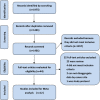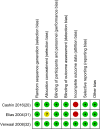Curative versus palliative treatments for colorectal cancer with peritoneal carcinomatosis: a systematic review and meta-analysis
- PMID: 29348899
- PMCID: PMC5762584
- DOI: 10.18632/oncotarget.21912
Curative versus palliative treatments for colorectal cancer with peritoneal carcinomatosis: a systematic review and meta-analysis
Abstract
The objective of this study was to provide an up-to-date summary of the current evidence that may be useful for updating guidelines. We comprehensively searched the published literatures and conferences for studies that compared curative with palliative treatments in colorectal cancer patients with peritoneal metastasis. The primary outcomes considered in this study were three- and five-year overall survival rates. We pooled data across studies and estimated summary effect sizes. Overall, patients who received curative treatments had improved three-year survival (hazard ratio (HR), 2.19 [95% CI, 1.83 to 2.62]) and five-year survival (HR, 2.22 [95% CI, 1.83 to 2.69]) compared with those who received palliative treatments. Patients who received curative treatments had an increased risk of treatment-related morbidity (odds ratio (OR), 2.90 [95% CI, 2.02 to 4.17]), but there was no significant difference in treatment-related mortality between patients who received curative treatments and those who received palliative treatments (OR, 1.46 [CI, 0.62 to 3.47]). Curative treatments improved overall survival in colorectal cancer patients with peritoneal metastasis and did not increase the risk of treatment-related mortality. Curative treatments were associated with a higher risk of treatment-related morbidity. These data highlight the importance for further investigation aimed at prevention of treatment-associated morbidity.
Keywords: colorectal cancer; cytoreductive surgery; intraperitoneal chemotherapy; meta-analysis; peritoneal carcinomatosis.
Conflict of interest statement
CONFLICTS OF INTEREST The authors declare no conflicts of interest.
Figures




Similar articles
-
Cytoreductive surgery plus hyperthermic intraperitoneal chemotherapy improves survival for peritoneal carcinomatosis from colorectal cancer: a systematic review and meta-analysis of current evidence.Oncotarget. 2017 Apr 27;8(33):55657-55683. doi: 10.18632/oncotarget.17497. eCollection 2017 Aug 15. Oncotarget. 2017. PMID: 28903452 Free PMC article. Review.
-
Peritoneal carcinomatosis of colorectal origin: incidence and current treatment strategies.Ann Surg. 2006 Feb;243(2):212-22. doi: 10.1097/01.sla.0000197702.46394.16. Ann Surg. 2006. PMID: 16432354 Free PMC article. Review.
-
Intraperitoneal-Free Cancer Cells Represent a Major Prognostic Factor in Colorectal Peritoneal Carcinomatosis.Dis Colon Rectum. 2016 Jul;59(7):615-22. doi: 10.1097/DCR.0000000000000589. Dis Colon Rectum. 2016. PMID: 27270513
-
Timing of Systemic Chemotherapy in Patients With Colorectal Peritoneal Carcinomatosis Treated With Cytoreductive Surgery and Hyperthermic Intraperitoneal Chemotherapy.Dis Colon Rectum. 2017 May;60(5):477-487. doi: 10.1097/DCR.0000000000000774. Dis Colon Rectum. 2017. PMID: 28383447
-
Incidence, prognosis, and treatment options for patients with synchronous peritoneal carcinomatosis and liver metastases from colorectal origin.Dis Colon Rectum. 2013 Dec;56(12):1373-80. doi: 10.1097/DCR.0b013e3182a62d9d. Dis Colon Rectum. 2013. PMID: 24201391 Review.
Cited by
-
Colorectal peritoneal metastases: Optimal management review.World J Gastroenterol. 2019 Jul 21;25(27):3484-3502. doi: 10.3748/wjg.v25.i27.3484. World J Gastroenterol. 2019. PMID: 31367152 Free PMC article. Review.
-
LncRNA SNHG6 inhibits cell proliferation and metastasis by targeting ETS1 via the PI3K/AKT/mTOR pathway in colorectal cancer.Mol Med Rep. 2019 Sep;20(3):2541-2548. doi: 10.3892/mmr.2019.10510. Epub 2019 Jul 19. Mol Med Rep. 2019. PMID: 31322251 Free PMC article.
References
-
- Stewart BW, Wild CP. World cancer report 2014. Geneva: WHO Press; 2015.
-
- Maggiori L, Elias D. Curative treatment of colorectal peritoneal carcinomatosis: current status and future trends. Eur J Surg Oncol. 2010;36:599–603. - PubMed
-
- Klaver CE, Stam R, Sloothaak DA, Crezee J, Bemelman WA, Punt CJ, Tanis PJ. Colorectal cancer at high risk of peritoneal metastases: long term outcomes of a pilot study on adjuvant laparoscopic HIPEC and future perspectives. Oncotarget. 2017;8:51200–51209. https://doi.org/10.18632/oncotarget.17158. - DOI - PMC - PubMed
LinkOut - more resources
Full Text Sources
Other Literature Sources

